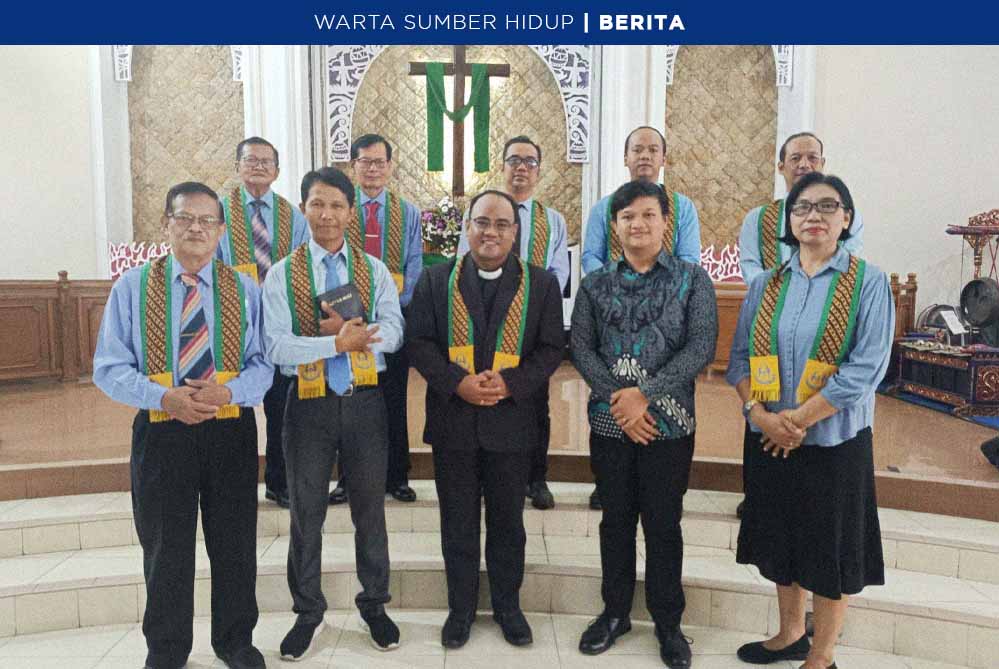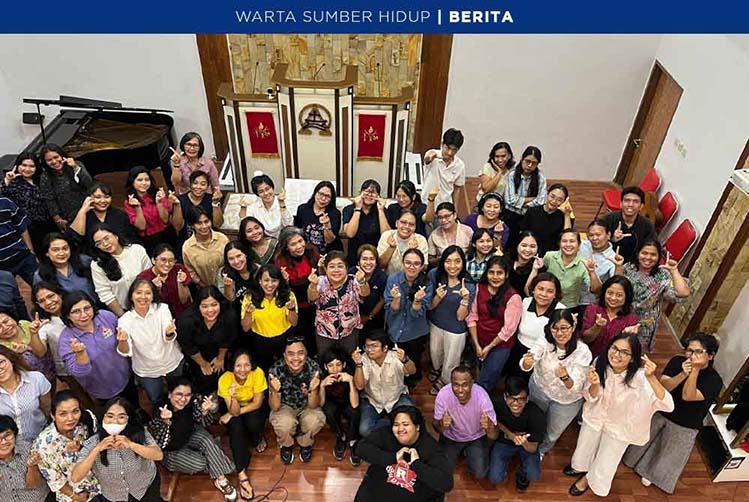Throughout the history of human civilization, the position of women in the social and religious order experienced dynamic tides. One central issue that continues to be a debate is the idea of submitting women to men, both in the domestic and public context, including in the church. It is not uncommon for the Bible verses to be the subject of discussion and even lawsuit, especially from the perspective of feminist theology. One of the verses most often in the spotlight is 1 Corinthians 14: 34-35, which explicitly states that "Just as in all the churchs of the saints, women must be silent in the meeting of the congregation." Is this a form of theological justification for women's submission? Or is the context more complex than what appears?
1 Corinthians 14: 34–35 TB2
"Just like in all the churches of the saints, women must be silent in the congregation meeting. Because, they are not allowed to speak. They must be submissive, as said by the law. If they want to know something, okay they ask her husband at home. Because, not polite for women to speak at the congregation's meeting".
This text is often seen as an absolute restriction to women's participation in the church. However, careful interpretation of this text shows the complexity in the delivery of Paul which cannot be separated from the context of culture, social, and even the structure of the text itself.
There are at least three main interpretation approaches to this verse:
1. Traditional view of 1 Corinthians 14: 34–35: Is this text a original view of Paul?
For those who adhere to this view, 1 Corinthians 14: 34–35 are considered to reflect Paul's deep position towards the role of women in the congregation. This view argues that the prohibition of speaking for women is absolute and applies in general. This is motivated by the dominant patriarchal culture at that time, which places women in a lower position than men, especially in the context of social and religious roles. In the community at that time, women were not considered appropriate to teach or lead in the meeting of the congregation, which was mostly led by men.
This view is often strengthened by referring to other texts, such as 1 Timothy 2: 11-12, which also voiced similar restrictions on women to teach or power over men. Thus, those who adhere to this view argue that Paul's statement in 1 Corinthians 14: 34-35 reflects his "original" view and must be accepted without change. This view sees the text as a guideline that applies forever, without considering contextual or situational differences that may exist in the first Christian churches.
Problems with the Traditional View: The Unseen Context
However, a problem arises when we compare 1 Corinthians 14:34–35 with 1 Corinthians 11:5, where Paul states that women may prophesy and pray in the congregation, provided they cover their heads. This statement seems to contradict the prohibition in 1 Corinthians 14:34–35. If Paul really thought women should not speak in worship, why did he give them permission to prophesy and pray? This raises the question of whether the prohibition on speaking in 1 Corinthians 14:34–35 is absolute or whether there are contextual factors to consider.
Views That Include Social and Educational Context
Some interpreters argue that the prohibition on women speaking in 1 Corinthians 14:34–35 is not absolute, but rather contextual and limited. According to this view, Paul is actually restricting women from speaking in situations where they have not been properly educated in the etiquette of public speaking. In that era, women often did not have enough education to participate effectively in public discussions or meetings, including church meetings. Therefore, this prohibition focused more on maintaining order and regularity in congregational worship, rather than restricting women’s roles as a whole.
Proponents of this view, such as Craig Keener, argue that Paul was more concerned with regulating the order of congregational meetings. If women had questions or were confused, they were allowed to ask their husbands at home, without disrupting the worship service. Thus, the prohibition on speaking only applied to women who were not educated in how to speak or interact in a public forum.
Furthermore, this view also assumes that once women had received sufficient education and understood the etiquette of speaking in public meetings, they were allowed to participate in prayer and prophecy, as stated in 1 Corinthians 11:5. Thus, women were not prohibited from speaking absolutely, but rather were prohibited from speaking in the right timing and context.
The Issue of Authority in the Culture of the Day
One of the concerns in 1 Corinthians 14:34–35 is the issue of authority. At that time, women were not allowed to exercise authority or criticize men in church meetings. In a patriarchal culture, women’s roles were limited to domestic roles, and it was considered inappropriate to give them the opportunity to criticize or evaluate male authority in the church. This may be one reason why women were not allowed to speak freely in certain contexts, even though they could pray and prophesy.
Eschatological View: Change Not So Urgent
Some interpreters also see Paul’s statement in an eschatological context. They argue that at that time, many people believed that the Lord’s coming was imminent and that the existing social structures, including patriarchal views of women, did not need to be changed because they would soon be renewed with the coming of God’s kingdom. In this view, the existing social rules, including rules regarding women’s roles, were considered temporary and not so important to change, because all things would soon be restored by God.
In conclusion, while the traditional view of 1 Corinthians 14:34–35 often interprets this text as Paul’s absolute and timeless view, it is important to consider the social, cultural, and educational context of the time. This text may reflect more of a practical regulation aimed at maintaining order in the congregational gatherings, rather than an absolute prohibition against women’s role in worship. In this sense, 1 Corinthians 14:34–35 can be seen as part of Paul’s contextualized approach to women’s roles in the congregation, which could vary depending on the situation and development of the times.
2. Rhetorical View: Paul Quotes the Corinthians' Views to Criticize Them
Paul's Rhetorical Style, Quoting to Criticize. This style is not new in Paul's writings. In 1 Corinthians itself, he several times quotes popular slogans or views circulating among the congregation to then refute or give new meaning in light of the Gospel. Examples are 1 Corinthians 6:12–13, 8:1, and 10:23–24. In these cases, Paul does not necessarily agree with the slogans he quotes, but uses them as a starting point for theological correction.
However, unlike the previous short quotations, the quotation in 1 Corinthians 14:34–35 is quite long, so it is not explicitly marked as a quotation in the original Greek text. This makes the interpretation that these verses are quotations speculative, although supported by a number of strong arguments.
Why is This Verse Considered Not Paul's View?
There are several main reasons why verses 34–35 are unlikely to have originated in Paul’s own thinking:
Based on the Law
Verse 34 states that women are to be submissive, as stated in “the law.” This is unusual for Paul, who in his other letters (such as Romans and Galatians) tends to be critical of the authority of the Law in Christian life. Paul only quotes the Law positively twice in 1 Corinthians (9:9 and 14:21), and then in very specific contexts. In 1 Corinthians 15:56, he even says that “the sting of death is sin, and the power of sin is the law.”
Internal Contradiction in the Same Letter
In 1 Corinthians 11:5, Paul acknowledges that women can prophesy and pray in church meetings, as long as they cover their heads. So it makes no sense that a few chapters later, Paul would forbid women from speaking at all. Interpreting verses 34–35 as a quotation from another source that is then criticized in verse 36 would elegantly resolve this contradiction.
Disjunctive Particles as Signals of Denial
Verse 36 begins with the Greek particle ἤ (ē), which can function to deny or correct a previous statement. This supports the idea that Paul is contradicting the content of verses 34–35.
Use of the Word “μόνους” (masculine plural)
In verse 36, Paul asks, “Or has the word come to you only?”: ἢ εἰς ὑμᾶς μόνους κατήντησεν. The word μόνους (monous), here masculine plural in Greek, is more likely to refer to the men in the congregation, not the entire congregation including women. This indicates that Paul’s criticism is directed at a group of men who want to monopolize spiritual authority and silence women.
3. Insertion/Interpolation View: This Verse Is Not Pauline
The main argument in favor of this view is the variation in the position of verses 34–35 in some early manuscripts. In some manuscripts, the verse does not appear after verse 33 as it does in the current standard text, but is moved to after verse 40. This is one of the common indications in textual studies that the passage is likely a later addition. In critical textual studies, a shift in position often indicates that a passage was not a permanent part of the original text.
Interruption of Argumentative Flow
Discursively, the presence of verses 34–35 interrupts the flow of Paul’s argument. Without these two verses, verse 33 could have continued directly and smoothly into verse 36, since they both deal with a consistent theme: order and propriety in congregational worship. Verse 33 itself concludes the discussion of prophecy and speaking in tongues by stating that “God is not a God of confusion but of peace.” Verse 36 then strengthens this argument by rhetorically questioning the authority of the Corinthians to determine the norms of worship, as if they were the sole recipients of God's word.
This oddity suggests that verses 34–35 are interpolations inserted to affirm certain social norms, most likely in line with the patriarchal ethos that developed in the post-Paul era, especially influenced by the spirit of 1 Timothy 2:11–3:1.
Why the Insertion?
The motive for this insertion is likely an adjustment to the more patriarchal social norms that were beginning to strengthen in the early church. Copyists or editors may have felt the need to emphasize the role of women in worship in order to conform to the ethics of decency and social order of the time. In this case, the text of 1 Timothy, which strongly forbids women from teaching and having authority over men, is the theological and sociological background for the emergence of verses 34–35 in the form of an insertion.
Weaknesses of the Insertion View
However, this view also faces challenges. All authoritative early manuscripts retain this verse, either in its normal position (after verse 33) or after verse 40. No manuscript omits verses 34–35 outright. Therefore, despite the variation in the position of the verse, its presence in all manuscripts indicates that this passage was very early in the 1 Corinthians textual tradition.
A Fairer Understanding of This Verse
If this text is to be retained as part of Paul’s letter (as it is in the existing manuscripts), then its interpretation must be nuanced so that it does not immediately become the basis for an oppressive interpretation of women. In this case, a reinterpretation of key terms becomes important.
The phrase “must be silent”- σιγάω (sigáō) does not always mean absolute silencing. In various contexts, it can mean: to stop speaking, to refrain, or to be silent in a certain sense. In the context of 1 Corinthians 14, sigao seems to refer to a prohibition on speaking in certain contexts, not in all cases.
The word “speak”- λαλεῖν (lalein) also needs to be seen in the context of the previous verses (vv. 29–33), where Paul discusses the practice of prophesying and the assessment of prophecy. In this case, what is prohibited is not all forms of speaking, but rather “responding” or “judging” prophecies, which is usually done by people who are able to distinguish (diakrino) between true and false prophecies. This prohibition can be understood as a prohibition against wives publicly “judging” their husbands’ prophecies, something that was unacceptable in the honor-shame culture of the ancient Mediterranean world.
What Does Paul Want to Avoid?
Paul seems to be concerned that if wives were too active in speaking and responding to their husbands’ prophecies in congregational meetings, chaos and conflict would arise that would disrupt the order of worship. Some of the consequences that Paul wants to avoid include:
- A public “trial” of husbands by their wives, which would be shameful in the culture of the time.
- Worship becomes a private debate and discussion, rather than a time to hear the word of God.
- A violation of the orderly and respectful etiquette of speaking, as upheld in the Jewish and Greco-Roman traditions.
- Chaos in worship, which is contrary to the spirit of peace (v. 33) and the principle of order that is in line with creation.

























